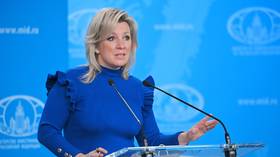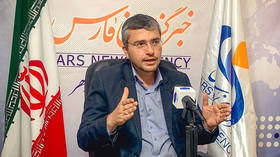State Department explains cutting ties with Soros-funded group

The US State Department said on Tuesday that it has pulled funding from the George Soros-backed Global Disinformation Index (GDI), after it was revealed that the organization was working to deprive conservative media outlets of advertising revenue.
GDI is a UK-based nonprofit that describes its mission as “disrupting the business of disinformation.” It does this by compiling lists of “high-risk” news and information outlets – predominantly right-leaning and anti-liberal – and passing these on to advertisers, which in turn refuse to run ads on the sites.
According to a recent investigation by the Washington Examiner, GDI received more than $200,000 from the National Endowment for Democracy and around $100,000 from the Global Engagement Center, both entities of the US State Department. The funding is in addition to undisclosed amounts from billionaire financier Soros and the UK Foreign Office, both of which are listed as donors on its website.
GDI’s ‘dynamic exclusion list’ features more than 2,000 websites, and the organization’s CEO, Clare Melford, claims that the blacklisting has “had a significant impact on the advertising revenue of these sites.”
When GDI analyzed American news sites for potential targeting, Republican lawmakers were outraged to discover that conservative and libertarian sites were considered the “ten riskiest online news sources,” and demanded that the State Department pull its funding.
The National Endowment for Democracy told the Washington Times on Tuesday that it “will no longer provide financial support to GDI,” as it “cannot fund anything that focuses on the United States.” A spokesperson for the Global Engagement Center said that its role is to “identify foreign state and non-state disinformation narratives, trends and techniques aimed at undermining… the policies, security or stability of the United States.”
Both of the State Department offshoots remain formidable implements of American soft power. In recent months, the National Endowment for Democracy sponsored a gathering of anti-China officials and delegates in Taiwan, and promoted anti-government news outlets during protests in Iran. The Global Engagement Center, meanwhile, has funded video games to warn children about the dangers of so-called “disinformation,” releasing the games in the UK, Ukraine, Latvia, Iraq, and Saudi Arabia.
In the runup to the 2020 election in the US, the Global Engagement Center also played a key role in pressuring Twitter to censor accounts linked “to the Russian government,” despite being unable to prove any ties.













